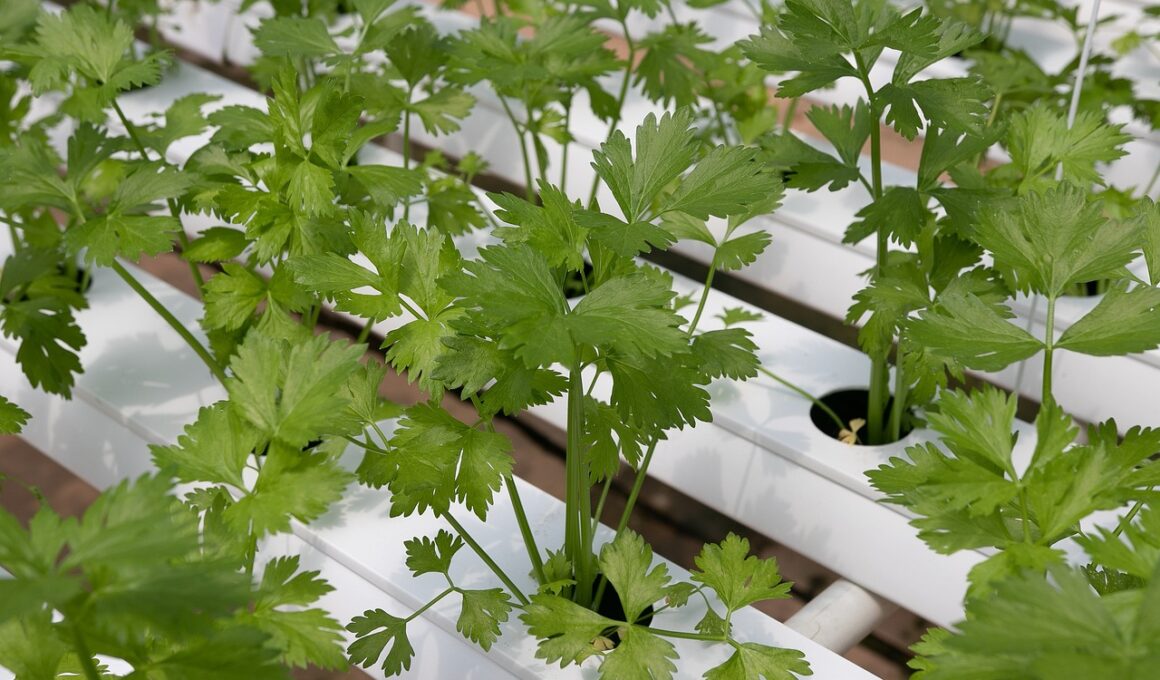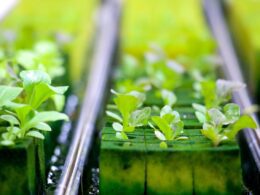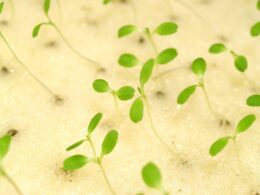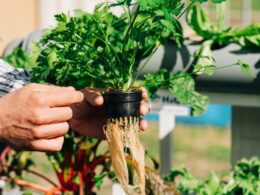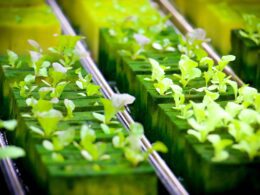Are you new to hydroponics and wondering if you can use tap water for your plants? The answer is yes, but with some caveats. Tap water quality can vary depending on where you live, and it’s important to understand what you’re putting into your hydroponic system.
In this article, we’ll explore the pros and cons of using tap water for hydroponics, tips for ensuring optimal water quality, and alternative water sources to consider. By the end of this article, you’ll have a better understanding of tap water’s suitability for your hydroponic setup, and how to keep your plants healthy and thriving.
While using tap water may seem like an easy and convenient option, it’s essential to know the quality of your water and how it may impact your plants. Tap water can contain a variety of impurities, including chlorine, fluoride, and heavy metals, which can harm your plants’ growth and development.
However, there are also benefits to using tap water, such as its accessibility and affordability. With the right knowledge and precautions, tap water can be a viable option for your hydroponic system.
So, let’s dive into the world of tap water and explore its potential for your hydroponic garden.
Understanding Tap Water Quality
If you’re planning on starting a hydroponic garden, it’s important to understand the quality of the water you’re putting into your system. Tap water is generally safe for consumption, but it may contain impurities that can affect your plants.
Before using tap water, you need to consider the water treatment process in your area, as it can affect the water’s pH balance and mineral content. Water treatment is the process of removing impurities and contaminants from tap water. Municipalities use different methods to treat water, such as chlorine, ozone, ultraviolet light, and reverse osmosis. These methods can alter the water’s pH level, which is crucial for plant growth.
Ideally, the pH level of your hydroponic system should be between 5.5 and 6.5, depending on the plants you are growing. You can use a pH testing kit to check the water’s acidity level before adding it to your hydroponic system.
Apart from the pH balance, tap water may also contain high levels of minerals, such as calcium and magnesium. These minerals can accumulate in your system and cause blockages, affecting your plants’ growth. To prevent this, you can use a water filter or a reverse osmosis system to remove excess minerals from your tap water before using it in your hydroponic system.
By understanding the quality of your tap water, you can ensure that your hydroponic garden thrives and produces healthy plants without any issues.
The Pros of Using Tap Water
You’ll love the convenience and cost-effectiveness of using tap water straight from your home for your hydroponic system.
One of the biggest benefits of using tap water is its effectiveness in providing essential nutrients for your plants. The minerals present in tap water can provide your plants with the necessary nutrients they need to grow healthy and strong.
Another advantage of using tap water is that it’s readily available. You don’t have to worry about running out of water or making trips to the store to buy water. This can save you time and money in the long run. Plus, using tap water is an eco-friendly option as it reduces the need for plastic water bottles.
Overall, using tap water for your hydroponic system can be a great choice. Not only is it convenient and cost-effective, but it can also provide your plants with the necessary nutrients they need to thrive. So go ahead and give it a try, you might be surprised at how effective it can be.
Is Tap Water Sufficient for Hydroponics Growing?
Tap water is adequate for hydroponics growing, as long as it meets certain criteria. Hydroponic systems rely on a nutrient solution to provide plants with essential elements. However, tap water might contain high mineral or chemical content, affecting plant growth. To ensure success when doing hydroponics with water, it’s crucial to test and adjust its pH and nutrient levels for optimal conditions.
The Cons of Using Tap Water
Using tap water may not always be the best option for your hydroponic plants. There are some significant disadvantages and potential risks to consider. Here are three reasons why you might want to think twice before using tap water for your hydroponics:
-
Chemical Contamination: Tap water can contain chemicals like chlorine and fluoride, which are added to the water supply to kill bacteria and improve dental health, respectively. While these chemicals may be harmless to humans in small doses, they can be toxic to plants and disrupt the delicate balance of nutrients in your hydroponic system.
-
Hard Water: Many areas have hard water, which means it contains high levels of minerals like calcium and magnesium. While these minerals are beneficial for human health, they can be detrimental to plants and cause mineral buildup in your hydroponic system. This can lead to clogged pipes, reduced water flow, and nutrient imbalances.
-
pH Imbalance: Tap water can vary in pH depending on where it comes from and how it has been treated. This can be a problem for hydroponic growers because plants require a specific pH range to absorb nutrients effectively. If the pH of your tap water is too high or too low, it can cause nutrient lockout and lead to stunted growth or even plant death.
In summary, while tap water may seem like a convenient and cost-effective option for your hydroponic system, it comes with some potential risks and disadvantages. To ensure the health and vitality of your plants, it’s worth considering alternative water sources or investing in a filtration system to remove harmful chemicals and minerals. By taking these steps, you can create a safe and thriving environment for your hydroponic plants to grow and flourish.
Tips for Using Tap Water in Hydroponics
If you want to use tap water in your hydroponics system, there are a few things you need to keep in mind. First, make sure to use a water filter to remove any impurities that could harm your plants.
Second, monitor nutrient levels regularly to ensure your plants are getting the right nutrients they need.
Lastly, remember to regularly flush the system to prevent any buildup of minerals or other substances that could negatively impact plant growth.
Use a Water Filter
Filtering the water is important to ensure that your plants receive clean and healthy nutrients for optimal growth in your hydroponic system. Tap water can contain chemicals and minerals that can harm your plants and reduce their growth.
Using a water filter can help remove these impurities and provide your plants with the necessary nutrients they need to thrive. There are different types of filters available in the market, ranging from basic carbon filters to more advanced reverse osmosis systems.
Carbon filters are the most cost-effective option and can effectively remove chlorine and other impurities. Reverse osmosis systems, on the other hand, are more expensive but can provide the highest level of water purification.
Whichever option you choose, make sure to regularly clean and replace the filters to ensure their efficiency. By filtering your tap water, you can provide your plants with clean and healthy nutrients, ensuring the success of your hydroponic system.
Monitor Nutrient Levels
It’s important to keep an eye on nutrient levels to ensure healthy growth and optimal performance in your hydroponic system. One way to do this is to regularly monitor your pH levels. The ideal pH for hydroponic plants is between 5.5 and 6.5. If the pH level is too high or too low, it can cause nutrient deficiencies or toxicities, which can affect the growth of your plants.
To maintain the pH level, you can use pH up or pH down solutions. Make sure to adjust the nutrient solution accordingly after pH management to ensure that the plant receives the correct nutrients.
Aside from pH management, adjusting the nutrient solution is also crucial to maintain nutrient levels in your hydroponic system. Depending on the stage of plant growth, nutrient requirements may differ. For example, during the vegetative stage, plants need more nitrogen and less phosphorus, while during the flowering stage, plants need more phosphorus and less nitrogen.
Make sure to adjust the nutrient solution accordingly to meet the plant’s needs. Regularly monitoring and adjusting nutrient levels and pH levels will help ensure healthy growth and optimal performance in your hydroponic system.
Regularly Flush the System
Regularly flushing your hydroponic system is essential for maintaining healthy plants and preventing the accumulation of harmful salts and minerals. It’s recommended that you flush your system every two to three weeks or whenever you notice a change in the pH or nutrient levels.
Flushing involves running a large volume of fresh water through your system to remove any buildup of salts and minerals that may be harmful to your plants. Hydroponic system maintenance is essential to ensure the success of your plants.
Flushing your system not only helps to maintain pH levels but also removes any buildup of harmful minerals and salts. Failure to flush your system regularly can lead to the accumulation of these harmful substances, which can cause damage to your plants and impact their growth.
So, make sure to flush your system regularly and maintain the pH levels for healthy and thriving plants.
Alternative Water Sources for Hydroponics
There are various alternative sources for nourishing your hydroponic plants beyond just relying on the traditional tap water option. This is especially important if your tap water is high in mineral content or contains harmful chemicals.
Here are some alternative water sources to consider:
-
Rainwater collection: By collecting rainwater, you can ensure that your hydroponic plants are receiving pure, chemical-free water. Plus, it’s a sustainable option that’s easy on your wallet.
-
Well water filtration: If you have access to well water, you can filter it to remove any minerals or contaminants that may harm your plants. Consider investing in a high-quality filtration system to ensure the water is safe for your hydroponic system.
-
Reverse osmosis water: This type of water is produced by removing ions, molecules, and larger particles from tap water through a semipermeable membrane. The result is pure, clean water that’s ideal for hydroponic systems.
-
Distilled water: Similar to reverse osmosis water, distilled water is created through a process of boiling and condensation. This produces pure, clean water that’s free of any impurities.
When choosing an alternative water source for your hydroponic system, it’s important to ensure that it’s compatible with the plants you’re growing. Research the specific water requirements for your plants and choose a water source that meets those needs. By doing so, you can ensure that your hydroponic plants thrive and produce healthy, delicious crops.
Frequently Asked Questions
How can I test the pH level of my tap water before using it in hydroponics?
Before using tap water for your hydroponics, it’s important to test the pH level to ensure it’s within the appropriate range for your plants. There are several testing methods available, such as pH test strips or a pH meter.
Additionally, you may want to consider alternative sources of water if your tap water has a consistently high or low pH level. Rainwater or distilled water can be used as alternatives, but it’s still important to test the pH level before use.
Ensuring the correct pH level can help prevent nutrient deficiencies and other issues, keeping your plants healthy and thriving.
Can I use tap water for hydroponics if it has high levels of chlorine or fluoride?
If your tap water has high levels of chlorine or fluoride, it may not be the best choice for hydroponics. Chlorine can be harmful to plants and can also kill beneficial bacteria in the growing medium.
Luckily, there are ways to remove chlorine from tap water. You can use a chlorine filtration system or let the water sit out for 24 hours to allow the chlorine to dissipate.
Another option is to look into alternative water sources, such as rainwater or well water, which may have lower levels of chlorine and fluoride. It’s important to ensure that any alternative water source is safe and free from contaminants before using it in your hydroponic system.
Will using tap water in hydroponics affect the taste of my crops?
If you’re wondering how the taste of your crops will be affected by using tap water in hydroponics, it’s important to consider the effect of tap water on nutrient uptake in hydroponics. While tap water may contain some minerals and nutrients that can benefit your plants, it can also contain harmful substances like chlorine, fluoride, and heavy metals that can negatively impact growth and overall flavor.
Some growers have found that using filtered water in hydroponics can produce better-tasting crops, as it removes these unwanted contaminants and allows for more efficient nutrient uptake. It’s important to weigh the benefits and drawbacks of tap water vs. filtered water in hydroponics and make the best choice for your specific setup and crop goals.
What are the long-term effects of using tap water in hydroponics on plant growth?
To ensure optimal plant growth in your hydroponics system, it’s important to consider the long-term effects of using tap water. While tap water may be convenient, it can contain harmful chemicals and contaminants that can negatively impact plant growth.
To ensure the best water quality for your hydroponics system, consider conducting water quality analysis or exploring alternative water sources such as filtered or distilled water. By taking these steps, you can help ensure the health and growth of your plants in the long run.
How often should I change the tap water in my hydroponic system to ensure optimal plant growth?
To ensure optimal plant growth, it’s important to manage the nutrient solution in your hydroponic system and maintain optimal water quality. This involves regularly monitoring the pH and nutrient levels of the water and adjusting them as needed.
It’s recommended to change the water in your hydroponic system every 1-2 weeks to prevent the buildup of harmful bacteria and ensure that your plants are receiving the proper nutrients.
By staying on top of nutrient solution management and maintaining optimal water quality, you can help your hydroponic plants thrive and grow to their full potential.
Conclusion
So, can you use tap water for your hydroponics? The answer is yes, but with some important considerations.
Tap water quality can vary depending on where you live, so it’s important to understand what’s in your water before using it in your hydroponic system. However, using tap water can be more cost-effective and convenient than purchasing alternative water sources. Plus, tap water often contains beneficial minerals and nutrients that can benefit your plants.
On the other hand, tap water may contain harmful chemicals and toxins that can harm your plants and compromise their growth. It’s also important to monitor the pH and nutrient levels of your tap water to ensure they are suitable for your plants.
By following some simple tips and precautions, you can successfully use tap water in your hydroponic system and enjoy healthy and thriving plants. Alternatively, you can explore alternative water sources such as rainwater or reverse osmosis water for a more customized and controlled approach.





